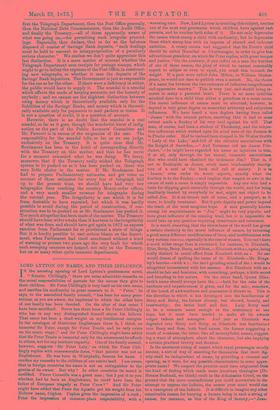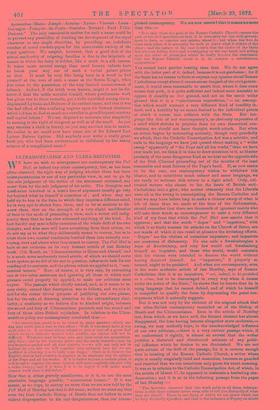LORD LYTTON ON NAMES, AND THEIR INFLUENCE. TN the amusing
opening of Lord Lytton's posthumous novel,
" Kenelni Chillingly," there are some admirable remarks on the moral responsibilities of parents for the names they give to their children. Sir Peter Chillingly is very hard on his own name, and ascribes his mediocrity in great measure to it. "Peter," he says, to the assembled family council, "has been for many gene- rations, as you are aware, the baptismal to which the eldest born of our family has been devoted. On the altar of that name I have been sacrificed. Never has there been a Sir Peter Chillingly who has in any way distinguished himself above his fellows. That name has been a dead-weight on my intellectual energies. In the catalogue of illustrious Englishmen there is, I think, no immortal Sir Peter, except Sir Peter Teazle, and he only exists on the comic stage ;" and Sir Peter Chillingly might have added that Sir Peter Teazle is immortal only for the amusement he affords to others, not for any intrinsic capacity. One of the family council, however, suggests Sir Peter Lely,' on which Sir Peter Chil- lingly replies with unanswerable force, "that painter was not an Englishman. He was born in Westphalia, famous for hams. I confine my remarks to the children of our native land. I am aware that in foreign countries the name is not an extinguisher to the genius of its owner. But why ? In other countries its sound is modified. Pierre Corneille was a great man; but I put it to you whether, had he been an Englishman, he could have been the father of European tragedy as Peter Crow ? " And Sir Peter might have added that Peter the Apostle got his weight from his Hebrew name, Cephas. Cephas gives the impression of a rock ; Peter the impression of common-place respectability, with a , I wavering turn. Now, Lord Lytton in touching this subject, touch ' one of the most real grievances which children have against rash f parents, and he touches both sides of it. He not only deprecates - the names which stamp a child with mediocrity, but he deprecatee those which stamp him with an impress of absurd and indecent ambition. A crusty cousin had suggested that Sir Peter's child should be called Hannibal or Charlemagne, in order to give him adventitious grandeur, on which Sir Peter replies, with great temper and justice, "On the contrary, if you inflict on a man the burthen of one of these names, the glory of which he cannot reasonably expect to eclipse or even to equal, you crush him beneath the weight. If a poet were called John Milton, or William Shakes- peare, he would not dare to publish even a sonnet. No, the choice of a name lies between the two extremes of ludicrous insignificance and oppressive renown." This is very just, and should bring re- morse to many a parental heart. There is no more indelible mischief done to a child than either a grandiose or a mean name. The moral influence of names must be admitted, however, to depend in very great degree on somewhat arbitrary and subjective influences. We have heard a man deplore having been called 'James' with the utmost pathos, asserting that it had to some extent made a flunkey of his very soul against his will. That man, of course, had been a student of Thackeray, and the subjec- tive influences which worked upon his mind were of the Jeames de la Pluche order. Had he instead been steeped in Sir Walter Scott's "Lady of the Lake," and full of the chivalric associations with the Knight of Snowdon,—" And Normans call me James Fitz- James,"—he might have regarded his name as injurious to him, if at all, only through its too unreal, romantic associations. But who could have idealised the nickname Jim ? That is, if not so flunkeyish as James, much more irredeemably descrip- tive of a soul at the beck and call of society. It is to ' James,' even under its worst aspects, exactly what thc footboy is to the flunkey,--and implies that respect or awe to the owner of such a name is simply impossible. Any one who had a taste for slipping good-naturedly through the world, and for being , familiarly treated by everybody he met, might not object to be called Jim. It is an honest sort of name, and a passport, as it were, to kindly treatment. But it puts dignity and power beyone the reach of the most sanguine hope. A man generally known among his acquaintances as " Jim " might be very popular and have great influence of the coaxing kind, but it is impossible he could take up any position requiring observance and reverence.
It is worth observing that the shrewdness of the world has gives a certain elasticity to the moral influence of names, by inventing a good many different modifications of them, and modifications with very various nuances, especially in the case of women. You can't have a much wider range than is contained, for instance, in Elizabeth, Eliza, Betty, Betsy, Bessy, and Bess, —Elizabeth with a z, again, being really distinct in moral effect from Elisabeth with an s. No one would dream of spelling the name of St. Elisabeth—Mr. Kings- ley's heroine—with a z; the hard grinding sound of the z would be altogether inconsistent with her essence. But Elisabeth with an s should be fair and feminine, with something, perhaps, a little secret and brooding in her nature. On the other hand, Queen Eliza- beth's name should always have the z,—both for the sake of the hardness and imperiousness it gives, and for the sake, somehow, of the touch of awkwardness and coarseness it throws in. This is the direction in which it has developed into the familiarities of Betsy and Betty, the former clumsy, but shrewd, homely, and trustworthy ; the latter loud and fast. Lady Betty used to be a common name enough in the aristocracy at one time, but it must have tended to make all its owners
vulgar talkers and managers. And just as Elizabeth was degraded into Betsy and Betty, so Elisabeth was familiarised into Bessy and Bess, both fond names, the former suggesting a touch of weakness, the latter, like all monosyllabic names, Bugged,- ing a want of atmosphere about the character, but also implying a certain practical brevity and decision.
Is the enormous string of names which royal personages usually assume, a sort of way of asserting for themselves that their dig-. nity shall be independent of name, by providing a channel and opening, as it were, for any possible characteristic in some appro- priate name? We suspect the practice must have originated from the kind of feeling which made some American theologian (Dr. Horace Bushnell, we think) exult in the Athanasian Creed, on the ground that the more contradictions you could accumulate in the attempt to express the Infinite, the nearer your mind would rise to a conception of the Infinite. It is difficult to imagine any other conceivable reason for burying a human being in such a string of names, for instance, as this of the King of Saxony,—" Jean-
iipomuchue= Marie- Joseph - Antoine - Xavier - Vincent - Louis - Gotizague - Francois - de-Paule - Stanislas - Bernard - Paul - Damans." The only conceivable motive for such a name could be to prevent any possibility of limiting the development of the royal character in one single direction, by providing an indefinite number of moral conduit-pipes for the conceivable variety of the royal qualities. We suspect, however, that a good deal of the actual mediocrity of reigning families is due to the labyrinth of names in which the baby is hidden, like a moth in a Bilk cocoon. It takes more mental energy than most human infants have to break your way out of such a verbal palace-prison as that. It must be very like being born in a wood to find yourself at the core of such a name as the Saxon King's, when you come to the possession of the very limited consciousness of infancy. Indeed, if the truth were known, might it not be dis- c over,d that the noble novelist himself, whose posthumous work has given rise to these remarks, got a little mystified among the re- duplicated Lyttons and Bulwers of his earliest name, and that it was the bad effect of this confusing impress upon his literary character which led him to deal so much ass novelist in grandiloquent mystery and capital letters ? We are disposed to maintain that simplicity in naming is the right of the great as well as of the small. As you may smother a child in luxury, so you may smother him in names. No realist in art could ever have come out of Sir Edward Earl Lytton Bulwer Lytton. Did anybody ever write a really great book yet, who had been embarrassed in childhood by the heavy armour of a complicated name ?







































 Previous page
Previous page